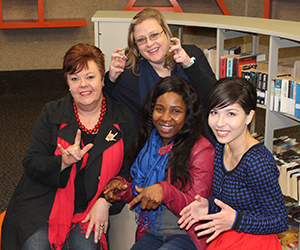Latest News Archive
Please select Category, Year, and then Month to display items
12 May 2023
|
Story Mbali Moiketsi
|
Photo iStock

Visiting universities and learning more about them is an essential part of prospective students’ journey into higher education. The University of the Free State (UFS) has launched the Kovsie-Connect Virtual Experience.
This is an initiative of the Student Recruitment Services in partnership with the Office for International Affairs to give the modern-day prospective student an experience of what the University of the Free State can offer. The Kovsie-Connect Virtual Experience is an interactive online platform that allows prospective students to engage and learn more about the UFS from the comfort of their own homes.
The Virtual Experience is tailor-made for local and international prospective students with the aim of providing an overview of academic offerings, facilities, and student life through a series of online documents, pre-recorded videos, and virtual tours.
The virtual format allows for easy accessibility and convenience, as potential students can attend the event from anywhere in the world without the need for travel. This experience aims to provide students with the information they need to make an informed decision and Choose the UFS!
 Click here to access the tour
Click here to access the tour.
Largest group on African continent introduced to Sign Language
2016-07-05
 The introduction of basic Sign Language
The introduction of basic Sign Language
as part of the UFS101 course was a great
success. From left are Susan Lombaard,
Annemarie le Roux, Tshisikhawe Dzivhani
(all from the Department of South African
Sign Language), and Lauren Oosthuizen
(UFS101). Photo: Leonie Bolleurs
As a result of a new initiative at the University of the Free State (UFS), the largest group of students on the African continent took part in a first-year seminar which included Sign Language.
A total of 5400 students on the Bloemfontein Campus and 1000 on Qwaqwa Campus were taught basic Sign Language by Susan Lombaard, Acting Head of the Department of South African Sign Language, and her team members, Tshisikhawe Dzivhani, Annemarie le Roux, and Nicolene de Klerk.
It forms part of the UFS101 module presented to all first-year students. The initiative, begun in the first semester of 2016, will form part of UFS101 in future and was met with an overwhelmingly positive response.
Three segments of course
Sign Language was taught in three segments and positioned as large-class learning experiences in the Callie Human Centre (Bloemfontein Campus) and the Nelson Mandela Hall (Qwaqwa Campus). Students were taught about deaf culture, Sign Language theory, as well as how to sign their names, exchange pleasantries, and have a basic conversation.
A valuable skill to have
“It (the Sign Language experience) was very interesting and helpful,” said one of the students. “It is important to have the ability to communicate with all sorts of people, and to be able to help them in a crisis”. According to another, it sparked an interest in Sign Language. “It is a skill I will continue to use and try to learn more from it,” said a third.
Lombaard – in collaboration with the UFS101 team – will be presenting a paper related to this achievement at the DeafNet Africa Conference in Johannesburg, from 26 to 30 September 2016.